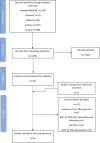Scoping review of risk-scoring tools for early prediction of bloodstream infections caused by carbapenem-resistant Enterobacterales: do we really have a reliable risk-scoring tool?
- PMID: 38414813
- PMCID: PMC10899000
- DOI: 10.1093/jacamr/dlae032
Scoping review of risk-scoring tools for early prediction of bloodstream infections caused by carbapenem-resistant Enterobacterales: do we really have a reliable risk-scoring tool?
Abstract
Background: Bloodstream infections (BSIs) caused by carbapenem-resistant Enterobacterales (CRE) are a global health concern. Rapid identification of CRE may improve patient outcomes and reduce inappropriate antibiotic prescription. The use of risk-scoring tools (RSTs) can be valuable for optimizing the decision-making process for empirical antibiotic therapy of suspected CRE bacteraemia. These tools can also be used to triage use of expensive rapid diagnostic methods.
Methods: We systematically reviewed the relevant literature in PubMed/MEDLINE, CINAHL, Cochrane, Web of Science, Embase and Scopus up to 1 November 2022 to identify RSTs that predict CRE BSIs. The literature review and analysis of the articles were performed by two researchers; any inconsistencies were resolved through discussion.
Results: We identified 9 RSTs developed for early prediction of CRE BSIs and only logistic regression was used for most studies. These RSTs were quite different from each other in terms of their performance and the variables they included. They also had notable limitations and very few of them were externally validated.
Conclusions: RSTs for early prediction of CRE BSIs have limitations and lack of external validity outside the local setting in which they were developed. Future studies to identify optimal RSTs in high and low CRE-endemic settings are warranted. Approaches based on rapid diagnostics and RSTs should be compared with a treatment approach using both methods in a randomized controlled trial.
© The Author(s) 2024. Published by Oxford University Press on behalf of British Society for Antimicrobial Chemotherapy.
Figures
Similar articles
-
Clinical and genomic characterization of carbapenem-resistant Enterobacterales bloodstream infections in patients with hematologic malignancies.Front Cell Infect Microbiol. 2024 Sep 26;14:1471477. doi: 10.3389/fcimb.2024.1471477. eCollection 2024. Front Cell Infect Microbiol. 2024. PMID: 39391886 Free PMC article.
-
Efficacy and Safety of Ceftazidime-Avibactam for the Treatment of Carbapenem-Resistant Enterobacterales Bloodstream Infection: a Systematic Review and Meta-Analysis.Microbiol Spectr. 2022 Apr 27;10(2):e0260321. doi: 10.1128/spectrum.02603-21. Epub 2022 Apr 4. Microbiol Spectr. 2022. PMID: 35377233 Free PMC article.
-
Rectal culture could predict carbapenem-resistant organism bloodstream infection and reduce the mortality in haematological patients: A retrospective cohort study.J Glob Antimicrob Resist. 2024 Mar;36:96-104. doi: 10.1016/j.jgar.2023.12.007. Epub 2023 Dec 19. J Glob Antimicrob Resist. 2024. PMID: 38128727
-
Continuous Evolution: Perspective on the Epidemiology of Carbapenemase Resistance Among Enterobacterales and Other Gram-Negative Bacteria.Infect Dis Ther. 2021 Mar;10(1):75-92. doi: 10.1007/s40121-020-00395-2. Epub 2021 Jan 25. Infect Dis Ther. 2021. PMID: 33492641 Free PMC article. Review.
-
Bloodstream Infections Caused by Carbapenem-Resistant Enterobacterales: Risk Factors for Mortality, Antimicrobial Therapy and Treatment Outcomes from a Prospective Multicenter Study.Infect Drug Resist. 2021 Feb 24;14:731-742. doi: 10.2147/IDR.S294282. eCollection 2021. Infect Drug Resist. 2021. PMID: 33658810 Free PMC article.
References
-
- Aslan AT, Kırbaş E, Sancak Bet al. . A retrospective observational cohort study of the clinical epidemiology of bloodstream infections due to carbapenem-resistant Klebsiella pneumoniae in an OXA-48 endemic setting. Int J Antimicrob Agents 2022; 59: 106554. 10.1016/j.ijantimicag.2022.106554 - DOI - PubMed
Publication types
LinkOut - more resources
Full Text Sources

